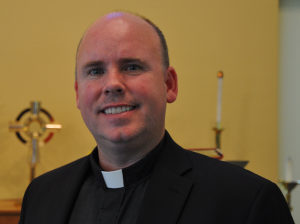First Sunday after Pentecost: Trinity Sunday
Sunday, June16, 2019
Lectionary C
Proverbs 8:1-4, 22-31
Romans 5:1-5
John 16:12-15
Psalm 8
I own a wonderful book that I came across in a bookstore somewhere, entitled, “What We Believe but Cannot Prove: Today’s Leading Thinkers on Science in the Age of Certainty.” This book, edited by John Brockman, has over 100 entries. Each entry is from one to three pages and covers subjects from psychology, artificial intelligence, global warming, alien life, cognitive science, string theory and many more that include life, the universe and well, everything.
One such entry is by Janna Levin, theoretical physicist and professor of physics and astronomy at Columbia University. The theory she cannot prove is this: “That there is an external reality, and that you are not all figments of my imagination.” I particularly like the theory of Rebecca Goldstein, professor of philosophy at Trinity College in Hartford, Connecticut: “I believe that scientific theories are a means of going somewhat mysteriously beyond what we observe of the physical world, of penetrating into the structure of nature.”
Did you get that? Using her own words again, what she is saying is, “I believe that theoretical parts of theories have descriptive content and are true (or false) in the same way that observational parts are true (or false). They are true if (and only if) they correspond to reality.”
I know what you’re thinking right now: “What in the world does this have to do with anything, Father Rob?” Well, this Sunday is Trinity Sunday, and many of us who have the responsibility of preaching in our local churches will speak about the holy Trinity. To be honest, most of us will end our sermons as heretics, having described the mystery of the holy Trinity in ways our seminary professors and learned colleagues could most assuredly pick apart, if not outright attack.
And so as I ponder the mystery of the Trinity – God the Father, Son and Holy Spirit – I go back to the title of the aforementioned collection of theories, “What We Believe But Cannot Prove.” I wonder if Augustine of Hippo Himself might have an entry that read something like this, “What I believe but cannot prove is that God is one in three persons: Father, Son and Holy Spirit.”
And so, I too make this bold statement about the Trinity. I also declare that although I cannot prove it, I know it to be true. I know it to be true because I know Jesus Christ both crucified and resurrected. In our reading this Sunday from John’s Gospel, Jesus says, “All that the Father has is mine. For this reason, I said that he will take what is mine and declare it to you” (John 16:15).

We have been given a glorious truth that requires both study and faith. This truth is born within the gift of the holy Trinity. This truth is declared in its beautiful mystery in the Nicene Creed. And this mystery gives me hope and joy.
So then, this much I know, but cannot prove. It is not simply about what I can prove; it is about faith in God, Father, Son and Holy Spirit, with whom Paul writes in our Romans passage, “Since we are justified by faith, we have peace with God through our Lord Jesus Christ, through whom we have obtained access to this grace in which we stand” (Rom. 5:1-2a). Amen!
– Father Rob Longbottom is rector of Church of St. Luke and St. Peter in St. Cloud.

